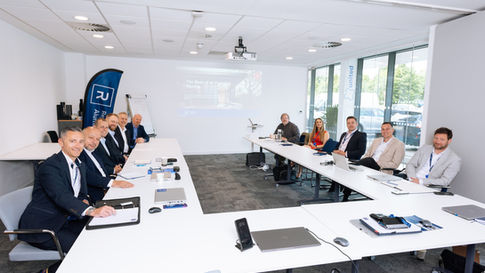Baxi’s 2024 Installer Skills Survey shows heating engineers play a key role in promoting the switch away from gas boilers, but are held back by a lack of practical training, complex government incentives and sluggish consumer demand.
Warwick, 25 September 2024 – Baxi, a leading manufacturer of heating and hot water solutions, has published its 2024 Installer Skills Survey, revealing that attitudes of heating engineers towards low carbon heating are hard to shift, contributing to the slow growth in UK heat pump adoption.

The survey, conducted in partnership with green supply chain consultancy Gemserv, examines the appetite and confidence of heating engineers to support households in their transition to clean heat technologies. It also reflects the future pace of change in the installer community. In the UK, around 18% of all carbon emissions comes from home heating*, with around 85% of homes using natural gas boilers.
As consumers often rely on a heating engineer’s expertise when deciding on heating options for their home, installers play an influential role in the decision to move away from natural gas boilers towards low-carbon alternatives, such as heat pumps. As such, the survey is an important indicator of the readiness of heating engineers to adopt and promote heat pumps in the context of evolving government policies and consumer demands. Over 300 installers took part in the survey, conducted in August 2024.
Although this year’s survey reveals more positive sentiment towards heat pumps compared to the first edition in 2022, it’s clear that many installers still lack the training, knowledge and incentive to help homeowners begin their transition away from gas boilers.
Just 9% of installers say they are fitting heat pumps. This is up from 3% in 2022 and 7% in 2023. Sentiment towards heat pump installation in the future looks weak, with half of installers saying they are “somewhat” or “extremely unlikely” to start fitting heat pumps in the next three years. This compares to 46% in 2022 and even less confidence - 53% - in 2023. There is more enthusiasm for hybrid systems – where a heat pump is combined with a gas boiler – with 30% of installers showing interest.
Government schemes, such as the Boiler Upgrade Scheme (BUS), are met with frustration in the survey, due to perceived complexity, excessive paperwork and lack of consumer awareness. Only 9% of installers rate government schemes as ‘’good’’ or ‘’excellent’’ and 42% say customers never mention the BUS.
A lack of confidence to promote and install low-carbon heating technologies has been a feature of the Installer Skills Survey since it began in 2022. This year, there is a slight improvement, with 11% of installers saying they are ‘extremely confident’ in discussing low-carbon technologies (up from 7% in 2023) and 35% ‘moderately confident’. This indicates that while training opportunities and industry communication are having a positive effect, many installers still lack the expertise to fully promote and install low-carbon heating technologies.
Practical training is key to building confidence, with 34% of respondents indicating a preference for hands-on learning. The perceived high cost of training, along with the complexities of MCS accreditation, are an ongoing obstacle to learning.
The lack of consumer demand for heat pumps further contributes to installers’ low engagement. Without strong consumer interest, installers continue to feel hesitant about making the transition to low-carbon heating, including investing in training. In the 2024 survey, only 3% of installers say customers always ask about low-carbon heating.
A recurring theme in all three surveys has been a generational divide among installers, with those nearing retirement less inclined to invest in training. As more new installers enter the industry, it’s expected that more will be willing to embrace new technologies. However, the transition will require further intervention from both government and industry to create a more supportive environment.
Baxi shared the findings of the survey at an event held at the Baxi Solutions Academy in Warwick on 24 September. Invited industry stakeholders shared their perspectives on the role of skills in the energy transition, and the critical dependencies that consumers, the supply chain, and the government have on installers to make the clean heat transition happen.
Ian Trott, Baxi’s Head of UK Training says, “While the 2024 survey shows some positive developments, particularly regarding hybrid systems, many of the challenges highlighted by previous surveys, such as insufficient training, poor government support, low consumer demand, haven’t moved on. The transition to low-carbon heating will require more targeted interventions to support installers in overcoming these barriers.”
James Higgins, Partner, Low Carbon at Gemserv, says: “The 2024 installer survey shows incremental progress in attitudes towards low-carbon heating technologies among installers, but as the industry moves forward, increased financial support, streamlined training opportunities, and efforts to raise consumer awareness will be crucial to achieving heat decarbonisation.’’
.png)








































.png)










